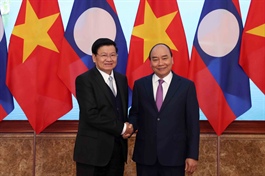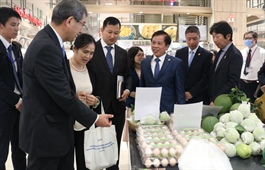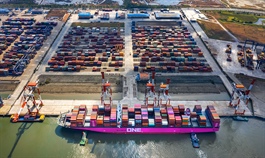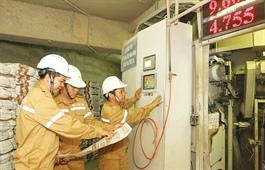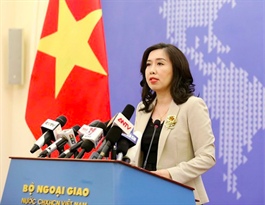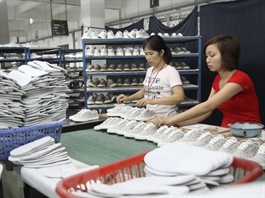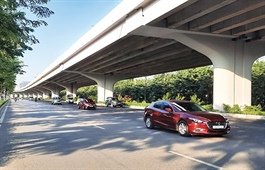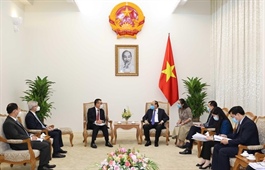Strengthening Vietnam- Laos economic ties
Strengthening Vietnam- Laos economic ties
Despite the good outcomes of the bilateral cooperation, Vietnam and Laos will have to accelerate cooperation in investment, trade exchange, and support building institutions.
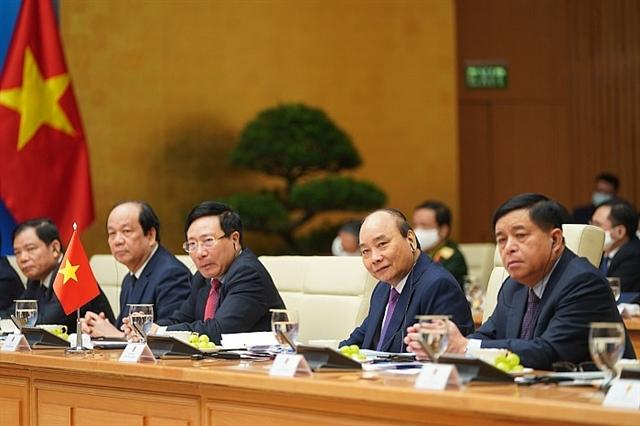
PM Nguyen Xuan Phuc and MPI Minister Nguyen Chi Dung at the Vietnam-Laos inter-governmental meeting
|
Yesterday (December 6), Prime Minister Nguyen Xuan Phuc and Lao Prime Minister Thongloun Sisoulith co-chaired the 43rd inter-governmental meeting of the two countries.
After the opening speeches of the two prime ministers, Vietnamese Minister of Planning and Investment and chair of the Vietnam-Laos Cooperation Committee Nguyen Chi Dung provided a report on the outcomes of the bilateral cooperation recently.
“Thanks to the directions of the two governments, the proactive collaboration and deployment by ministries, agencies, localities, businesses, as well as the implementation of the Vietnam-Laos Cooperation Strategy in 2011-2020, some five-year agreements (2011-2015, 2016-2020), and cooperation agreement in 2020, have already achieved the targets set forth, contributing to the stability and development of each country, as well as strengthening and boosting the relations between Vietnam and Laos," Minister Dung said.
In addition to the cooperation in politics, foreign affairs, national defense, the minister confirmed that cooperation in economy, trade, and investment have been receiving attention to develop and gain good results. Vietnam has established a task force to support Laos to improve fiscal and monetary policies in line with the proposal of PM Thoong lun.
Besides, investment has also been promoted, with Vietnam having invested around $4.2 billion in Laos, covering 413 projects, up 35 per cent compared to 2010 (248 projects, $3.1 billion). So Vietnam maintains the third position (behind China and Thailand) among investors in Laos.
"Especially, investment from Vietnam to Laos in 2020 has developed significantly," said Dung. Over the last 11 months, there were eight newly-registered and capital-adjustment projects, with $88.73 million in total investment, up 43.1 per cent on-year ($62 million). These included a high-tech dairy and beef farm by Vinamilk, the Bauxite and Aluminafactory of Viet Phuong Investment Group JSC.
"As of date, Vietnam's businesses like Unitel Laos and LaoVietBankhave contributed hundreds of millions of dollars to Laos' state budget," the MPI minister added.
Trade exchange in the first nine months of the year was $750 million, a light decrease of 10 per cent on-year, and is expected to reach $1 billion by the end of 2020, especially in power purchase and transportation.
Additionally, Vietnam has provided some non-refundable aid to Laos valued at VND930 billion ($40.43 million) in 2020, increasing by 30 per cent on-year. This is the third consecutive year when the entire planned budget is disbursed. Over the last 10 years, Vietnam's non-refundable aid to Laos reached VND6.35 trillion ($276.1 million), putting into use 54 projects of high quality.
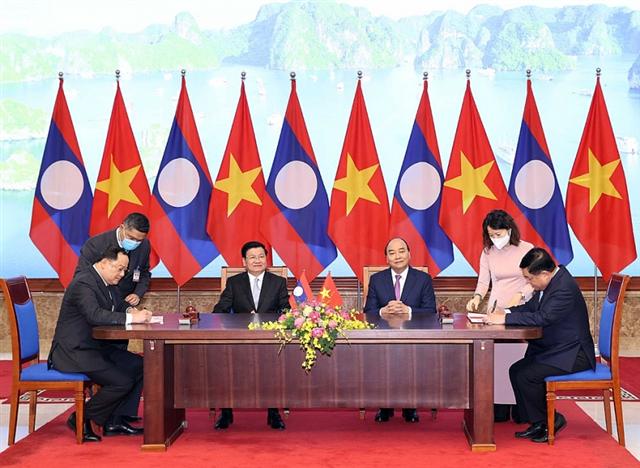
MPI Minister Nguyen Chi Dung and Laos MPI Minister Sonsai Siphandone signing the agreement for 2021 under the witness of the two PMs
|
Despite highly appreciating the outcomes, Minister Nguyen Chi Dung also pointed out some shortcomings and challenges. Some high-level agreements have been delayed, while the performance of delegate exchanges was wanting.
Plans to connect the two economies in terms of institutions, administrative procedures, and transport infrastructure are deployed too slowly while some projects are delayed or cancelled, trade turnover is not in accordance with the potential and strengths of the two sides.
"In the time to come, we should strengthen the connection and support of the two economies, especially in transport, power, telecommunications, and tourism," the minister highlighted.
Thereby, Minister Dung raised some solutions to resolve difficulties like supporting the firms of the two countries in terms of capital, tax, and labour by creating a stable, transparent legal framework and a favourable business climate as well as providing a special mechanism for major projects.
"We should effectively encourage and protect investment, continue organising meetings between the two countries' governments and business communities," added Dung.







